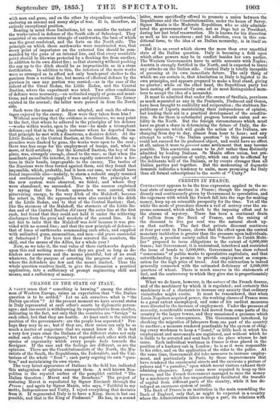CHANGE IN THE STATE OF ITALY.
A. VAGUE sense that "something is brewing" among the states- men of Western Europe, raises an expectation that " the Italian question is to be settled." Let us ask ourselves what is "the Italian question "? At the present moment we have several states in Italy represented at each other's courts by diplomatic person- ages; and one court is withdrawing its representative from another, indicating in the fact, not only that the countries are "foreign" to each other, but that they are hostile. At least such is the relative position of the governments : are the people less separated P Per- haps they may be so ; but if they are, their union can only be so much a matter of conjecture that we cannot know it. It is but a very few years since the Italians of the different states not only called each other "foreigners," but regarded each other with that species of superiority which every people feels towards the foreigner. If the race and the feelings are different, so are the opinions. There are the Constitutionalists of the North, the Mu- ratiste of the South, the Republicans, the Federalists, and the Uni- tarians of the whole "Boot" ; each party arguing its own "ques- tion," and maintaining its own views.
The very latest appearance of Italians in the field has indicated this antagonism of opinion amongst them. A well-known Nea- politan is the reputed author of the pamphlet entitled "The Italian Question : Murat and the Bourbons." The project of restoring Murat is repudiated by Signor Ricciardi through the Prase ; and again by Signor Manin, who says, "Faithful to my motto, Independence and Unity, I reject everything that deviates from it. If regenerated Italy is to have a King, there is but one possible, and that is the King of Piedmont." He has, in a second letter, more specifically offered to promote a union between the Republicans and the Constitutionalists, under the house of Savoy. Signor Manin is the Moderate Republican who so ably adminis- tered the government of Venice, not as Doge but as President, during her last brief resurrection. He is known for his discretion as well as his earnestness ; and his adhesion, even in this con- ditional form, to the idea of an Italian monarchy, is in itself an event.
But it is an event which shows the more than ever unsettled state of the Italian question. Italy is becoming a field neon which other powers may be in conflict besides her own parties. The Western Governments have to settle accounts with Naples; Austria is strongly fortified in the North, and is expected to brave any attacks on the Italian side. Central Italy is totally incapable of guessing at its own immediate future. The only thing of which we are certain is, that Absolutism in Italy is bigoted to its own principles, and appears prepared to make a final stand, giving no quarter; while on the other Inind, the Republican party has been casting off successively some of its most distinguished mem- bers to accept the idea of a monarchy. It must be admitted that under the crown of Sardinia, provinces as much separated as any in the Peninsula, Piedmont and Genoa, have been brought to cordiality and cooperation ; the stubborn Re- publicans of Liguria maintaining their independence of opinion, but lending their aid in a practical development of the constitu- tion. So far there is substantial progress towards union and so- lidity in the North. But the foreign circumstances which must have so great a share in determining the future of Italy, the do- mestic opinions which will guide the action of the Italians, are changing from day to day, almost from hour to hour; and any attempt to settle "the Italian question" in this present week could not succeed for its professed object, and could have no effect at all, unless it were to prevent some settlement that may become possible. This conviction seems to be felt rather than distinctly admitted by leading Italians. So Manin offers union, but pre- judges the very question of unity, which can only be effected by the deliberate will of the Italians, or by events stronger than all Italian parties put together. But the moderating of dogmatic demands indicates a tendency to unite, more promising for Italy than all formal subscriptions to the motto of " Unity."


































 Previous page
Previous page